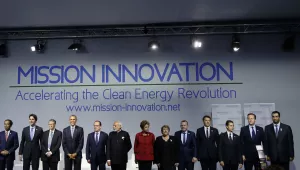The Caspian Studies Program hosted a seminar at the Kennedy School of Government that focused on Ankara’s energy policies and the long-term Eurasian energy picture. This event featured Mehmet Ogutcu, a former member of Turkey’s diplomatic corps who currently heads the Organization for Economic Cooperation and Development (OECD)’s Non-Members Liaison Group and Global Forum on International Investment.
During the same week when seven cabinet ministers resigned from Prime Minister Bulent Ecevit’s governing coalition in Turkey, the Caspian Studies Program hosted a seminar at the Kennedy School of Government that focused on Ankara’s energy policies and the long-term Eurasian energy picture. This event featured Mehmet Ogutcu, a former member of Turkey’s diplomatic corps who currently heads the Organization for Economic Cooperation and Development (OECD)’s Non-Members Liaison Group and Global Forum on International Investment.
Ogutcu began his talk by acknowledging that any analysis of Turkey’s long-term energy strategy is very difficult at the moment, since the recent political upheaval in Ankara makes the country something of a “moving target.” Prime Minister Ecevit is now in the midst of making a desperate attempt to hold on to the fraying reins of his coalition government. In early July, three of his key ministers—Foreign Minister Ismail Cem, Deputy Minster Husamettin Ozkan, and Economic Minister Kemal Dervis—resigned from Ecevit’s cabinet in order to plant the seeds of a new political alliance (Dervis was later persuaded to stay on to manage Turkey’s ongoing economic crisis).
The widespread expectation in Turkey is that these three leaders will form a new political party that will serve as the standard-bearer for European Union membership, solution of the impasse in Cyprus, and continued economic and political reform in Turkey. Ecevit has been a popular figure during the past several decades of Turkish politics, but young leaders impatient with his failing health and the slow place of political and economic reform are eager to jump-start the country’s campaign for EU membership and achieve long overdue reforms.
Turkey’s Immediate Challenges
The current political turmoil in Turkey could not have come at a more critical moment for both Turkey and its international allies, including the United States and the European Union. In order to provide some context on the more immediate concerns that will affect Turkey’s long-term energy strategy, Ogutcu identified the main short-term challenges that Turkey currently faces.
The Fragile Economic Recovery Program. Ogutcu noted that even before the recent political crisis in Ankara, Turkey has had to face several economic challenges, including:
- A large underground economy (estimated at 30 to 100 percent the size of the formal economy);
- Sharp income inequalities, particularly between urban and rural areas of the country;
- A large and inefficient state sector and low levels of private investment;
- A failure to generate new jobs for the country’s rapidly growing population;
- A significant foreign and domestic debt burden;
Turkey is the largest recipient of International Monetary Fund (IMF) loans (at a little over $16 billion). Most Western governments and international lending organizations have been pleased with Economic Minister Kemal Dervis’ stewardship of the country’s reform programs, even though most Turks continue to suffer significantly as the economy moves painfully toward reform. There has been talk of securing additional IMF loans to help advance Turkey’s economic recovery, but these negotiations may become more difficult after recent political events in Ankara.
Election Schedule and EU Accession. Turkey’s parliamentary elections were originally scheduled for April 2004, but the country’s diminished ruling coalition recently announced its would hold elections in November 2002.
Turkey’s political future will hinge on the question of what sort of government will be in place before the December 2002 European Union summit, when the EU is expected to give Ankara the definitive green light to begin accession negotiations. Some of the points of contention between Turkey and the EU have included Turkey’s dispute with Greece, the fate of Cyprus, language and cultural rights for the country’s Kurdish population, the death penalty, and Turkey’s human rights record. Within Turkey, debates about how far to concede to EU demands on these issues—especially on the death penalty and Cyprus—were part of the reason behind the recent split within the government. It remains to be seen whether a new government would be more or less willing to embrace these aspects of a reform agenda geared toward Turkey’s obtaining EU membership.
Turkey’s Foreign Policy and U.S. Policy vis-à-vis Iraq. The United States continues to talk about the strong possibility of some sort of military action in Iraq during the next year—an action that will require the use of Turkey’s military bases.
It is very much in the United States’ interest for Turkey to remain as stable as possible, since it is the main U.S. strategic ally along Iraq’s borders. Washington is eager to see a government in Ankara that continues to implement a pro-Western agenda and is willing to cooperate against Iraq.
Ogutcu outlined Turkey’s concerns about the consequences of possible U.S. action in Iraq. For instance, destabilization of the regime in Baghdad could lead to calls among Kurds in both northern Iraq and southeastern Turkey for the creation of a state of “Kurdistan.” Nor have Turks forgotten the bitter economic lessons the post-Gulf War period, when sanctions against the Iraqi regime ended up costing Turkey $35 billion in lost trade revenues. Mindful of these concerns, U.S. Deputy Secretary of Defense Paul Wolfowitz recently visited Turkey in order to discuss the possible consequences of a post-Saddam geopolitical configuration in the region.
After discussing these three urgent issues on Turkey’s more immediate short-term agenda, Ogutcu moved on to the main subject of his talk: Turkey and Eurasian energy geopolitics.
Turkey and the Geopolitics of Eurasian Energy
Ogutcu began the energy-oriented part of his talk by analyzing the impact Russia and China will have on Eurasian energy considerations over the next several decades.
According to Ogutcu, Russia will continue to play a very significant role in the future of regional energy markets. The Russian government has often coordinated with OPEC in attempting to control international oil prices in the past, but since the fall of 2001 Moscow has acted independently from the cartel—a move that pleases Western oil companies. Ogutcu indicated that the OECD has been impressed with President Vladimir Putin’s rhetorical commitment to economic reform, a commitment that—if it is implemented—should help Russia strengthen its position on the international oil and gas markets. In addition, the improved post-September 11 relationship between Moscow and Washington should facilitate Russia’s bid to join the World Trade Organization.
In addressing Russia’s untapped energy potential, American and Russian oil firms have already begun to cooperate on energy investments in Russia’s Sakhalin and Siberian oil fields. Firms in both countries are also very interested in investing in the Caspian, particularly in the surprisingly rich oil fields of Kazakhstan. Russian and Caspian oil has become even more attractive in the wake of the September 11 attacks, which further exposed the political instability of OPEC countries such as Saudi Arabia and Iraq.
Both Russia and the United States realize, however, that the Central Asian countries where some of these new energy investment opportunities exist are not entirely free of the threat of Islamic radicalism. Ogutcu noted that a prominent example of this phenomenon was the cancellation in 1998 of a major gas pipeline project in Central Asia that was designed to go from Turkmenistan through Afghanistan to Pakistan and India. This project was under serious consideration by Unocal in the mid-1990s, but was halted when the Taliban regime came to power in Afghanistan in 1998.
Along with the other countries of East and South Asia, China will represent a much larger share of international oil demand during the next two to three decades. China’s domestic energy requirements are expected to double to 21 million barrels of oil a day (which will be the equivalent to 16 percent of the world’s total demand) by 2020. In addition China currently imports 22 percent of its oil, but that figure is expected to grow to 75 percent over this period. Consequently, an increasingly energy-hungry China could turn to Russia and the oil- and gas-producing countries of Central Asia and the Caucasus. For China, energy is very much a significant security concern. The government in Beijing wants to have oil and gas pipelines running from Central Asia to northwestern China—because it would make China less dependent on volatile Persian Gulf producers and would also help address China’s vulnerability to an energy-oriented naval blockade. These energy developments might address another one of Beijing’s strategic goals: curbing the growth of the Turkic separatist movement in the country’s Xinjiang-Uighur autonomous region, which borders Central Asia.
Can Turkey Be Eurasia’s “Energy Bridge”?
Turkey’s 67 million people are significantly increasing their levels of energy consumption, which are currently far below the OECD average. At present, the country imports 90 percent of its oil and is very dependent on Russia for its natural gas. Turkey’s power plants are largely fueled by natural gas and Ankara has already secured large natural gas supply contracts with Russia and Iran. It has also negotiated contracts with Azerbaijan and a number of liquefied natural gas (LNG) producers.
In fact, Turkey has been so active in negotiating new natural gas contracts that it may have overcommitted itself and oversaturated the future domestic natural gas market in the process—even before the possibilities of coordinating with new Central Asian natural gas producers such as Turkmenistan or Kazakhstan have been explored fully. The irony of this situation is that even if Turkey has overcommitted itself in the future natural gas market, it currently suffers from frequent blackouts and brownouts because of lack of energy supplies and infrastructure. But if Turkey’s economic reforms continue to show signs of long-term improvement, the country’s demand for energy will increase and the country will need to do more to develop a comprehensive strategy to deal with its energy demand and invest in energy production and distribution.
Turkey is not only a significant energy consumer. It is also a natural “energy bridge” between major oil producing areas in the Middle East and the Caspian Sea regions on the one hand, and European consumer markets on the other. It is home to both the Bosporus Straits and the future Baku-Tbilisi-Ceyhan (BTC) Pipeline from the Caspian Sea. The Bosporus is already an important conduit for bringing Russian and Caspian oil to the international market, and the BTC pipeline is expected to become one by the end of this decade. BP has led the BTC project and anticipates that the pipeline will bring 1 million barrels a day to the international market by 2008. The BTC Pipeline has been a favorite project of both the United States (because it allows Caspian oil to get to market without having to travel through Russia or Iran) and Turkey, because it should help contain the level of tanker traffic in the Bosporus (which already presents severe environmental hazards to the region).
According to Ogutcu, Turkey’s role as an energy transit country may help it to improve its relations with Russia, which have been quite troublesome at certain times in the past. There are still some considerable political and military differences between Moscow and Ankara in the Caucasus and Central Asia, but trade and business connections between these two societies have helped to put relations between these two countries on better footing over the past decade.
Q & A
Most of the question and answer session involved an extended exchange between Ogutcu and Nurlan Kapparov, the former vice-minister of energy in Kazakhstan who is currently a Mason Fellow at the Kennedy School. Kapparov indicated that Kazakhstan originally agreed to send 400,000 barrels of crude a day to the BTC pipeline only if Turkey agreed to buy some 20 billion cubic meters (bcm) of Kazakhstani natural gas per year. Kapparov indicated that the BTC pipeline would not be viable if it does not have the participation of Kazakhstan, and expressed concern about what might happen if Turkey is not able to honor its commitments to buy natural gas from Kazakhstan.
Ogutcu responded to Kapparov’s comments by explaining that it will be difficult for Turkey to accept any additional natural gas because it has already overextended itself in trying to secure natural gas for its domestic market. Turkey has signed deals of gas imports with Russia, Iran, Azerbaijan, Egypt, and Turkmenistan for amounts that are nearly double the current level of Turkish gas consumption (around 73 percent will come from Russia, 17 percent from Iran, and 8 percent from Azerbaijan). But Turkey’s forecasts for rapid gas demand will not be realized. Already in May 2001, Turkey announced “technical” delays in two major natural gas import projects with Iran and Russia in response to its own economic slowdown.
Ogutcu said he was not aware of any binding commitment for Turkey to buy Kazakhstan’s gas in exchange for a commitment to supply Kashagan oil to BTC pipeline; yet he indicated that Turkey could make a sincere effort to help Kazakhstan find markets for its natural gas—perhaps in Southeastern Europe. Ogutcu said that Kazakhstan’s other options included greater use of the existing Russian pipeline system or the use of yet-to-be-constructed pipelines to East and South Asia. Kapparov acknowledged that Kazakhstan, with its rapidly expanding volumes of production, has already begun to explore other pipeline routes besides BTC, including routes that might have their terminus in Iran.
In his closing remarks, Ogutcu indicated that Turkey’s strategic partnership with the United States, its anticipated accession into the EU, and its proximity to Eurasia and the Middle East all make Ankara an indispensable partner on regional energy cooperation projects and geopolitical arrangements in and around the Caspian basin.
Summary by John Grennan, Caspian Studies Program



